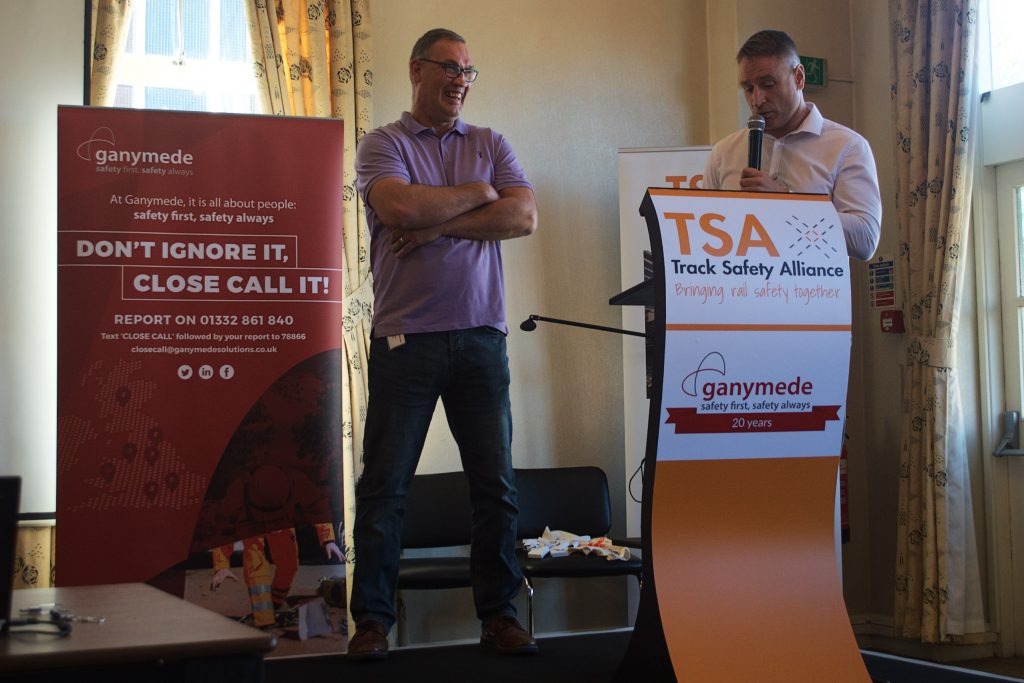More delegates than ever before attended the latest Track Safety Alliance (TSA) conference in October, which was held away from Network Rail’s Westwood training centre for the first time.
More than 200 delegates from Network Rail, its principal contractors and other key stakeholders met at the Derby Conference Centre – the home of event sponsor Ganymede – to discuss the burning issues surrounding worker health, safety and wellbeing.
Heart-to-heart
TSA chair and Network Rail project director Brian Paynter kickstarted the programme with a demonstration highlighting how some people are unprepared to help someone in cardiac arrest. Although the volunteer asked to locate an automated external defibrillator (AED) happened to work in the building and knew where to find it, the exercise stressed to many audience members that, had someone on stage be having a genuine cardiac arrest, they would neither know where to locate an AED or have the confidence to use it.
AEDs have already been mandated for all of Brian’s team’s possessions in plain line track renewal, but he is keen to see awareness of what to do in such a situation increased and people’s knowledge tested with similar exercises in the future.
Lee Green, head of safety and sustainability for Network Rail Infrastructure Projects (IP) Track, added: “We’re more likely to lose somebody on a site associated with a cardiac arrest than an injury or being struck by a train.
“It’s not just about the defib, it’s if we’re prepared for it, have we simulated it, do we know where that ambulance needs to go to and how convinced are we that we are able to give ambulances clear directions to meet us.”
Attendees were also introduced to the ‘High Output Health Challenge’. The programme was developed for workers to monitor and record a number of key metrics – such as their sleep pattern, weight and exercise regime – over the course of 26 weeks to improve the four elements of the “jigsaw of health”: sleep, nutrition, fitness and mental health. Plans are in place to roll it out across the TSA in 2019.

Driving change
One of the day’s biggest talking points centred on fatigue and driving. After the audience watched real footage from the event, a McGinley trackman and driver who was involved in a road traffic collision with a lorry after experiencing a micro sleep, stepped on stage to talk about the incident.
The driver was 100 per cent compliant, had rested earlier in the day, did not feel tired but said that, in the future, he would give his body more rest and look to leave the track earlier if he had to drive to and from a site and work.
John Jebson, McGinley HSQE director, said the industry needs to change its practices. He added: “If we are going to move people around the country, where local contingent labour isn’t there, let’s think of drivers as an asset, not a worker for a railway.
“This is about catastrophic risk. PTS workers and a driver should be two separate things, that’s my challenge to industry.”

Change
Network Rail IP Track programme director Steve Featherstone also updated the audience on key safety metrics – the stand out figure being the 69 per cent reduction in the lost time injury frequency rate in three years.
Two years ago at a previous TSA conference, members started the conversation around ballast dust and, with the issues raised in October, it will be interesting to see how quickly things progress in the years ahead.
Steve said: “If you think two years ago, when we were sitting here talking about ballast dust, we hadn’t even started the journey around respirator protective equipment. Now it’s everywhere and we’re making a really big impact.
“It shows that when the TSA decides to change things, we can change things very rapidly.”
Read more: How Network Rail is starting difficult conversations to address workplace taboos


